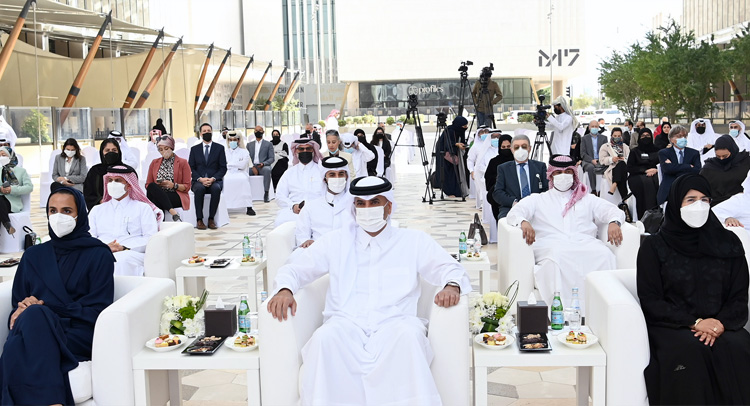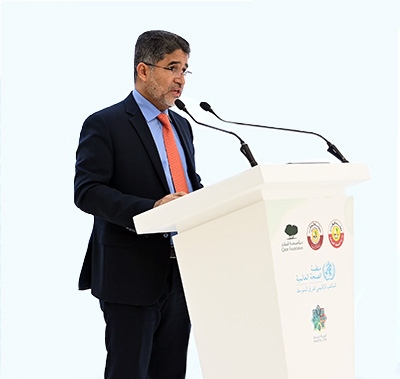
Doha, 13 February 2022 - His Excellency Sheikh Khalid bin Khalifa bin Abdulaziz Al Thani, Prime Minister and Minister of Interior, today attended a WHO ceremony awarding Doha and Al Rayyan municipalities “Healthy City” status and designating the Qatar Foundation’s Education City a “Healthy Education City”. The Ministry of Public Health, in collaboration with the Ministry of Municipality and Qatar Foundation, organized the ceremony to mark the event in Msheireb Downtown.
 The ceremony was attended by Her Excellency Sheikha Hind bint Hamad Al Thani, Vice Chairperson and CEO of the Qatar Foundation, Her Excellency Dr Hanan Mohamed Al-Kuwari, Minister of Public Health, His Excellency Mr Abdulla bin Abdulaziz bin Turki Al Subaie, Minister of Municipality, and Dr Ahmed Al-Mandhari, WHO Regional Director for the Eastern Mediterranean, in addition to other high-level officials from the Ministry of Public Health, Ministry of Municipality, Qatar Foundation and WHO.
The ceremony was attended by Her Excellency Sheikha Hind bint Hamad Al Thani, Vice Chairperson and CEO of the Qatar Foundation, Her Excellency Dr Hanan Mohamed Al-Kuwari, Minister of Public Health, His Excellency Mr Abdulla bin Abdulaziz bin Turki Al Subaie, Minister of Municipality, and Dr Ahmed Al-Mandhari, WHO Regional Director for the Eastern Mediterranean, in addition to other high-level officials from the Ministry of Public Health, Ministry of Municipality, Qatar Foundation and WHO.
The Healthy City programme aims to improve the health of populations by promoting health and well-being, improving equity, enabling communities and preventing the main causes of ill health through incorporating health in all policies and enhancing cooperation and partnership across sectors and society.
The Healthy Education City award is part of the Health-Promoting Universities programme and the Healthy City programme. This award reflects the Qatar Foundation's dedication to promoting health and well-being, as well as its commitment to supporting members of the community to reach their full potential.
Her Excellency Sheikha Hind bint Hamad Al Thani, Vice Chairperson and CEO of the Qatar Foundation, said: “Improving people’s health and well-being within our cities and communities requires shared commitment and action from many stakeholders, including the Qatar Foundation.
“Collaborative work of this kind has been instrumental in the World Health Organization granting two municipalities in Qatar the status of a ‘Healthy City’, and we look forward to contributing to further efforts to make our cities healthier places in which to work, learn and live.”
Her Excellency Dr Al Kuwari said: “The adoption of the Healthy City initiative affirms Qatar’s commitment to achieving universal health. We aim to promote physical and mental health for all members of our population through our health strategy and the Qatar National Vision 2030. We have developed strong partnerships by bringing together policy-makers, researchers, academics and leaders from different sectors and industries through the development of a Healthy City network, to facilitate joint work and collaborations aimed at improving the health and well-being of our population.”
“Receiving the WHO Healthy City accreditation for Doha and Al-Rayan municipalities, as well as the recognition of Education City as a Healthy Education City, is a reflection of the efforts across government and key stakeholders towards prioritizing the health and well-being of the population of Qatar. It is also a commitment to continue to push the health agenda forward. This is the first step in our Healthy City accreditation journey and we are committed to achieving this accreditation for all eight municipalities,” Her Excellency added.
Qatar aims at getting all eight municipalities accredited as healthy cities by the WHO to provide sustainable and healthier options for the population.
His Excellency Mr Abdulla bin Abdulaziz bin Turki Al Subaie, Minister of Municipality, said: “The awarding of Doha and Al Rayyan as Healthy Cities by the WHO affirms Qatar's commitment to transform Qatari cities into healthy cities, through sustainable urban development and high-quality life to improve the health and well-being of all people across Qatar. This achievement is a culmination of efforts to develop all municipalities in the country and to upgrade the level of projects and services provided to residents, to achieve the Ministry of Municipality's strategic goals of maintaining eco-friendly cities with green, healthy and scenic facilities, and enhancing the 'ease of living' and quality of life".
His Excellency, the Minister of Municipality, expressed his appreciation to the Ministry of Public Health, Qatar Foundation and all relevant partners for their sincere efforts that led to the awarding of two of Qatar’s largest and most important municipalities as Healthy Cities by WHO, following the joining of three Qatari municipalities, namely Al Wakra, Al-Shamal and Al Shahaniya, to the UNESCO Global Network of Learning Cities.
“The Healthy City approach is a comprehensive approach that integrates multidisciplinary actions across different sectors, and encourages community engagement, partnership, empowerment and equality among city dwellers. A Healthy City promotes better health and improves the social determinants of health as an urban issue that requires commitment and concerted action,” said Dr Ahmed Al-Mandhari.
“The State of Qatar has demonstrated significant commitment to improving health and well-being and to strong cooperation among partners from government, academia and civil society, ensuring that the health and well-being of its population remain a top priority. This reflected strong commitment towards the regional Vision 2023: Health for All by All. I would like to congratulate the municipalities of Doha and Al Rayyan for obtaining WHO's Healthy City award, as well as the Qatar Foundation's Education City for obtaining the title of Healthy Educational City, in recognition of their outstanding achievements. We hope that the initiative will be extended to all the cities and municipalities of the State of Qatar,” he added.
Healthy Cities is a WHO initiative that aims to place health high on the social and political agenda of cities by promoting health, equity and sustainable development through innovation and multisectoral change. It aligns with the regional Vision 2023 of Health for All by All. Healthy City status is awarded to cities around the world that meet the criteria set by WHO.
The Healthy City programme in Qatar is one of the strategic projects under the “Health in All Policies” priority of the National Health Strategy 2018–2022. It adopts an intersectoral collaborative approach to improving health and equity for all populations by incorporating health considerations and implications into all decision-making processes and policies across government. The programme focuses on four areas of work: establishment of strong governance structures; community engagement and empowerment; behavioural change interventions; and strengthening monitoring and evaluation. A WHO delegation paid a field visit to Doha and Al Rayyan municipalities earlier to evaluate their eligibility for Healthy City status.


